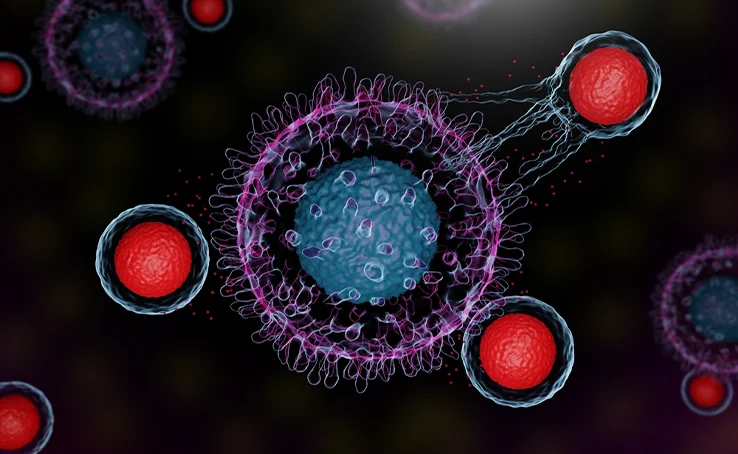Avg Price:


Treatment Time
Recovery Time
Hospitalization Days
Success Rate
This isn't science fiction; it's CAR T-Cell Therapy, a treatment that rewires your immune system to find and eliminate Cancer. In areas where conventional treatments are failing, such as certain Blood Cancers (Including leukemia, Lymphoma, or multiple myeloma), this FDA-approved ground-breaking treatment strategy is transforming the way we combat cancer. It works by modifying the T-cells to recognize and destroy cancer cells.
With its remarkable success in treating Blood Cancers with tailored Immunotherapy, CAR T Cell Therapy has completely changed the way that cancer is treated. It is one of the most recent and promising treatments for Blood Cancer. It combats Cancer cells by using the body's own natural defences. Therefore, CAR-T Therapy is intended to be a one-time treatment, in contrast to many other Medical Therapies for Blood Cancer.
Beyond Blood Cancers, researchers are now pushing CAR T Cell Therapy to target solid tumours with improved delivery, precision, and resilience in the face of tough challenges.
But who can benefit from CART-T Cell Therapy, and how does it work? Let's explore the science of this revolutionary treatment!
Certain Blood Cancers can be treated with Immunotherapy using chimeric antigen receptor (CAR) T-Cell Therapy. This therapy functions by efficiently transforming your T lymphocytes (T cells) into Cancer fighting machines. In CAR T-Cell treatment, doctors introduce an additional gene that alters your cell activity and increases their capacity to identify and eliminate malignant cells. It is very effective in treating Blood Cancer. If it is unable to completely cure the Cancer, it helps in prolonging the lives of many Blood Cancer patients. It is advised for the treatment of following types of Blood Cancer:
Mode of Action
Knowing more about T Cells, which are White Blood Cells in your immune system, may help you comprehend better how CAR T-Cell Therapy functions. Your immune system tracks proteins called antigens present on the surface of invading cells to watch out for invaders, including Cancer cells.
Receptors are proteins on the surface of your T cells. These receptors are able to identify cells with abnormal antigens. When a receptor identifies an aberrant cell, T cells activate, serving as a monitoring mechanism for aberrant cells. In addition to eliminating the aberrant cell, the activated T cell also triggers the other components of your immune system to assist in locating and eliminating the aberrant cell.
However, Cancer cells are not always detected by your T-cell receptors. CAR T cells, which are your own T cells modified to identify a particular antigen on the surface of cancer cells. By introducing a synthetic gene for a chimeric antigen receptor, researchers can modify your T cells. They then encourage the growth and multiplication of the newly generated CAR T cells until there are sufficient cells to efficiently target cancer cells.
CAR T-cell receptors identify and eliminate cancer cells once they enter your bloodstream. Additionally, the cells continue to proliferate, ensuring that you have a steady supply of CAR T cells that are specifically targeting the cancer cells. This treatment is also called a "living drug" because of its sustained delivery and prolonged activity.
Take Charge of Your Health
Book a Free Consultation

Following are the various types of CAR T-Cell Therapies:
Doctors conduct specific tests to differentiate eligible and ineligible Cancer patients for CART-T Therapy:
Your Health is Our Priority
Book a Free Consultation
First, you undergo a process known as leukapheresis to get your white blood cells extracted. During leukapheresis, a machine takes a small amount of your blood, separates the white blood cells, and then gives the rest back to you. To take and return your blood, the doctor treating you will use a central venous catheter.
Your White Blood Cells will then be immediately transported to the laboratory where specialists will convert them into CAR T cells. Three to six weeks may be needed for this process.
An intravenous line (IV) is used to administer a CAR T-cell infusion, which takes five to thirty minutes. During the procedure, you might have to stay in the hospital.
Neurological problems and cytokine release syndrome are the two most common adverse effects. The symptoms of cytokine release syndrome, an inflammatory condition, include:
Neurological issues associated with CAR T-Cell Therapy:
Other potential side effects are:

Because of the potential for serious complications, your doctor might advise that you stay in the hospital post-procedure. The length of your hospital stay might range from seven to ten days, depending on your circumstances and appearance of any side effects. The first month following treatment should then be spent at a location that is accessible by car from your treatment facility. During this time, you have someone with you all the time in case you have adverse affects. Once your T cells are ready, you will need someone to drive for you for two months.
Avail the Expert Health Advice
Book a Free Consultation
After receiving CAR T-cell treatment, many patients have better quality of life and long-lasting remission. But in the initial weeks after therapy, the journey entails careful observation for any adverse effects, such as cytokine release syndrome (CRS) and neurological alterations. Blood testing, immune function evaluations, and routine follow-ups aid in monitoring recovery. Some people recover rapidly, while others could suffer from extreme tiredness or a compromised immune system that needs supportive treatment and immunisations. Many survivors may now anticipate a cancer-free future with proper post-treatment management because of the ongoing developments in CAR-T therapy.
When other Therapies fail or the Cancer returns (Recurs), CAR T-Cell Therapy stands as a reliable option for treating some types of blood cancer. Sometimes certain Blood Cancers get completely cured using CAR T-Cell Therapy. It can prolong the lives of many Blood Cancer patients.
A research conducted in 2020 monitored children undergoing this Therapy for acute lymphoblastic Leukaemia. Over 85% of the children experienced complete remission after CAR T-Cell Therapy and 60% of such children remained cancer-free for a year after the treatment.
When compared internationally, India's CAR T-Cell Therapy costs are significantly more affordable:
| Country | Approximate Cost (USD) |
| Australia | $ 320,000 to $ 385,000 |
| United States | $ 373,000 to $ 475,000 |
| United Kingdom | $ 320,000 to $ 360,000 |
| Thailand | $ 150,000 to $ 200,000 |
| UAE | $ 325,000 to $ 490,000 |
| India | $ 4,878 and $ 85,000 |
Following are the hospitals that providing CAR T-Cell Therapy in India:
| S.No. | Hospitals | Type of CAR-T Cell Therapy | CAR T-Cell Therapy in India (In USD) |
| 1 | Tata Memorial Centre, Mumbai | Autologous CD19-targeted CAR-T cells | $50,000 - $85,000 |
| 2 | Apollo Hospitals, Chennai | CD19-targeted CAR-T cells (CAR-T 19) | $50,000 - $85,000 |
| 3 | Christian Medical College (CMC), Vellore | CD19 and BCMA-targeted CAR-T cells | $50,000 - $85,000 |
| 4 | HCG Cancer Centre, Bengaluru | CD19-targeted CAR-T cells | $50,000 - $85,000 |
| 5 | AIIMS, New Delhi | CD19-targeted CAR-T cells | $50,000 - $85,000 |
| 6 | Fortis Memorial Research Institute, Gurgaon | CD19-targeted CAR-T cells | $50,000 - $85,000 |
| 7 | Max Super Speciality Hospital, New Delhi | CD19-targeted CAR-T cells | $50,000 - $85,000 |
| 8 | Jaslok Hospital and Research Centre, Mumbai | CD19-targeted CAR-T cells | $50,000 - $85,000 |
| 9 | Rajiv Gandhi Cancer Institute and Research Centre, New Delhi | CD19-targeted CAR-T cells | $50,000 - $85,000 |
| 10 | Amrita Institute of Medical Sciences, Kochi | CD19-targeted CAR-T cells | $50,000 - $85,000 |
Total estimated diagnostic cost for CAR T-Cell Therapy in India is $900 - $2,400. The following cost split will help you in analysing your approximate cost.
| Diagnostic Tests | Estimated Cost (USD) (Approx.) |
| Tumor Antigen Testing (Flow Cytometry & IHC) | $ 120 - $ 300 |
| Bone Marrow Biopsy & PET-CT Scan | $ 180 - $ 480 |
| Complete Blood Tests (CBC, LFT, KFT, Coagulation Profile, etc.) | $ 60 - $ 120 |
| Cardiac Function Tests (ECHO, ECG, Troponin Levels) | $ 60 - $180 |
| Neurological Assessment (MRI Brain, Cognitive Function Tests) | $ 120 - $ 360 |
| Infectious Disease Screening (HIV, Hepatitis B/C, CMV, etc.) | $ 60 - $ 180 |
| Pulmonary Function Tests (PFTs, Chest X-ray, or CT Chest) | $ 60 - $ 145 |
| Genetic & Molecular Testing (NGS, PCR-based Tests) | $ 240 - $ 60 |
MedFlick, your trusted healthcare companion, is dedicated to ensuring that your medical journey goes as smoothly and successfully as possible.
Fostering expertise backed by commitment, resilience and years of experience, we connect you to a wide network of India's best doctors
Explore the most advanced, reputable and trusted hospitals in India, offering the highest levels of clinical and surgical excellence

The worlds most trusted personalized health community with more than 1,00, 000 members that share their journey, experiences and health insights. Join your community and get access to make informed health decisions.
Explore



